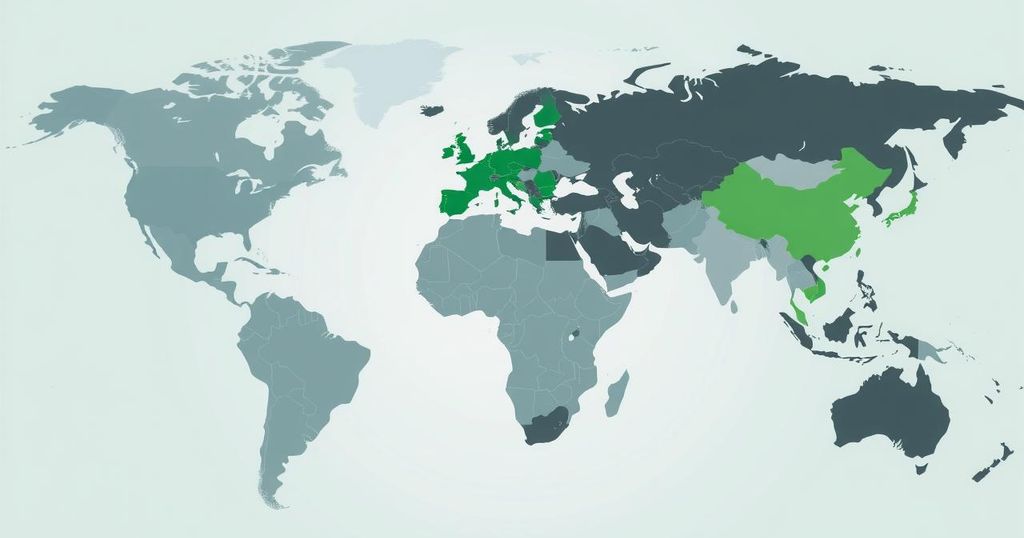The 2024 World Air Quality report reveals Chad and Bangladesh as the most polluted countries, with only seven nations meeting WHO standards. India, though home to 74 of the most polluted cities, ranks fifth in national pollution levels. The report emphasizes the need for international cooperation to tackle the trans-boundary nature of air pollution effectively.
The 2024 World Air Quality report from IQAir reveals that Chad and Bangladesh are the most polluted countries globally, with Delhi identified as the most polluted capital. Alarmingly, only seven countries—Australia, New Zealand, the Bahamas, Barbados, Grenada, Estonia, and Iceland—met the World Health Organization’s air quality standards, highlighting a significant global pollution crisis, particularly in the Global South.
The report indicated that of the 100 most polluted cities worldwide, 74 are located in India, a decrease from 83 last year. Although India has seen a 7% decline in PM2.5 levels, averaging at 50.6 micrograms per cubic meter—ten times the acceptable limit—the nation ranks fifth overall in pollution due to other countries’ worse conditions, namely Chad, Bangladesh, Pakistan, and the Democratic Republic of Congo.
Globally, merely 17% of the nearly 9,000 surveyed cities met the WHO’s PM2.5 threshold of 5 micrograms per cubic meter. The majority of the significant pollution issues are concentrated in Asia. Despite some improvements, pollution data from Africa remains sparse, with only 24 out of 54 countries reporting in 2024.
The report arrives amid a major reduction in US air quality monitoring systems following the closure of monitoring stations at US embassies under the Trump administration. This has resulted in a significant loss of vital air quality data, particularly impacting developing countries like Chad, where local monitoring is limited.
Dr. Christi Chester Schroeder, IQAir Air Quality Science Manager, emphasized the importance of data collected at US embassies, stating that it has historically aided in public health protection and air quality policy formulation. The cessation of local air monitoring will leave several countries without real-time information on air quality, posing a substantial risk to public health measures
In South Asia, the report presents concerning statistics revealing that Bangladesh, Pakistan, India, and Nepal occupy the second, third, fifth, and seventh positions for national pollution levels, respectively. Although India leads in monitoring capabilities, under-reporting remains a significant issue in many regions.
The findings call for collaborative efforts across national borders, as pollution crosses regional boundaries. Dr. SN Tripathi from IIT Kanpur has suggested that India should take the initiative to establish cooperative agreements with neighboring countries regarding air quality management.
The report draws attention to India having the most polluted capital globally and highlights that Byrnihat, Meghalaya, has the highest PM2.5 concentration. India’s national average pollution levels have risen, primarily due to vehicular emissions exacerbated by infrastructural challenges.
In comparison to other regions, India’s significant advancements in monitoring indicate a potential for addressing pollution more effectively. However, disparities exist due to urban-centric monitoring, which fails to account for rural pollution levels.
In China, despite a general decline in pollution levels across over 320 cities, specific cities continue to struggle. Chinese authorities have set ambitious targets to lower PM2.5 concentrations significantly by 2035.
Indonesia faces challenges despite a 4% decrease in pollution levels. The country remains Southeast Asia’s most polluted nation, heavily reliant on coal for energy production. In Vietnam, air quality issues have led to significant economic losses, prompting community initiatives aimed at sustainable practices.
Hawaii’s Honaka’a recorded the cleanest air, showing a stark contrast to the severe conditions seen elsewhere. The report underscores the pressing need for robust environmental policies and cooperation to combat air pollution effectively and safeguard public health globally.
The 2024 World Air Quality report indicates that air pollution continues to pose a significant threat globally, with Chad and Bangladesh leading in pollution levels. While some countries have made strides in monitoring and reducing air quality impacts, many areas, especially within the Global South, remain severely underreported. The findings call for urgent collaborative actions and agreements to address trans-boundary pollution challenges, as unchecked air quality issues adversely affect public health and economic stability.
Original Source: healthpolicy-watch.news






